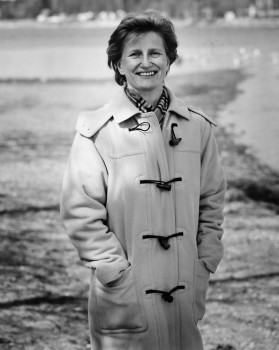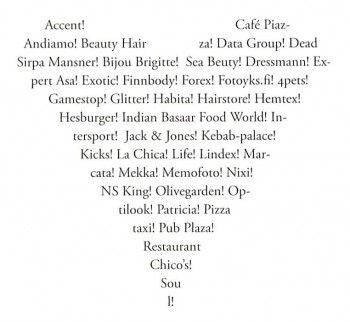Search results for "Aseguranzas para autos Pompano Beach FL llama ahora al 888-430-8975 Calcular valor de seguro automotor Buscador seguros auto La caja de seguros automotor Asegurar mi auto online Seguro basico para auto Corredor de seguros"
Intelligent living
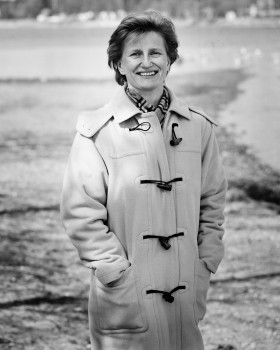
Minna Lindgren. Photo: Ville Palonen.
In Ehtoolehdon tuho [‘The decline of Twilight Grove’, Teos, 2015), the final novel in a trilogy about life in an assisted living home, employing human staff has become too expensive and the old folk are part of a pilot project in which they are cared for by electronic devices, monitors, cameras, ‘smartwalls’ and cleaning robots: ‘there was intelligence everywhere, masses of it, just a hiccup and something terribly intelligent would happen.’
The aged lady residents don’t like their new life, but they’re resilient; they’re not about to let the new technology defeat them…
Minna Lindgren’s mordantly satirical, often hilariously funny writing has earned her a wide readership. Translations of the trilogy are soon to appear in English, German and French.
![]()
An excerpt from Ehtoolehdon tuho [‘The decline of Twilight Grove’, Teos, 2015). Review by Soila Lehtonen
‘You’re 97 today! Your wakeup call service today congratulates!’
As if she wouldn’t have remembered. Ninety-seven was almost a hundred. She and Irma had decided that they would refuse to turn one hundred. It would only make trouble. One lady, in the bottom apartment of the A staircase, had received an invitation to the health centre on her birthday. Apparently all five-year-olds were called in for monitoring of their motor and psychological development, and when this lady turned 105, the computer system thought she was a toddler. The computer didn’t recognise numbers over one hundred. Siiri thought the lady should have kept the appointment; she would have done, for the tests were fun. You had to draw a triangle and walk along a straight line. Not that easy for someone of 105. But the lady didn’t go, she just made a terrible fuss about it and complained to everyone, until she died before her complaints reached the right official. More…
Life is
16 February 2012 | Letter from the Editors
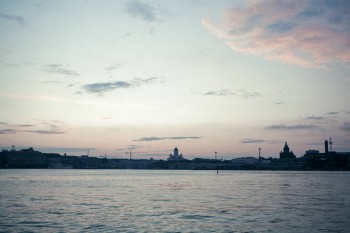
Helsinki silhouette. Photo: Valtteri Hirvonen, Eriksson&Company / World Design Capital Helsinki, 2011
Where is Books from Finland located?
In the old days, the answer was simple, although not unambiguous. Books came from its office in central Helsinki; it was written in various locations in Finland and abroad, and translated mainly in England and the United States; and it was published in the small town of Vammala, about 200 kilometres north of Helsinki.
It spread, in multiple paper copies, to readers throughout the world, to find its place on desks, on bedside tables, in briefcases and handbags, propping up table-legs or holding doors open – in London, England, Connecticut, New England, with a few in Paris, France, and Paris, Texas, maybe. More…
New from the archives
19 February 2015 | This 'n' that
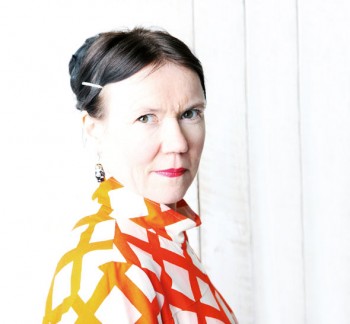
Rosa Liksom. Kuva: Pekka Mustonen
When the pseudonymous Rosa Liksom (born 1958; real name Anni Ylävaara) burst on the Finnish literary scene in 1985 with her first book, Yhden yön pysäkki (‘One night stand’), excitement was intense. For a start, she managed to keep her real identity secret, even when she appeared at public events and book-signings; then, she wrote generally in her native northern Finnish dialect, which hadn’t previously been heard very much in literary circles. Her very short short prose charted landscapes also not much represented in literature – the far north, the uneducated, the dispossessed.
This group of seven stories, from her second book, Tyhjän tien paratiisit (‘Paradises of the open road’, 1989), cover territory which has become familiar in her work: a woman who marries a layabout, a bellicose butcher’s son, a cleanliness fanatic for whom hygiene is more important than human relationships….
Rosa Liksom won the Finlandia Prize in 2011 for Hytti nro 6, which was published by Serpent’s Tail, London, in a translation by Lola Rogers last year.
*
The digitisation of Books from Finland continues apace, with a total of 360 articles and book extracts made available online so far. Each week, we bring a newly digitised text to your attention.
Get out of my Face(book)!
23 June 2010 | Columns, Non-fiction, Tales of a journalist
 Much is made of the importance of Facebook and the other social media. But what are they, asks journalist and self-confessed internet cynic Jyrki Lehtola in his regular ‘Journalist’s Tales’ column; and, more important, is there any point to them?
Much is made of the importance of Facebook and the other social media. But what are they, asks journalist and self-confessed internet cynic Jyrki Lehtola in his regular ‘Journalist’s Tales’ column; and, more important, is there any point to them?
This journal and this text appear only on the internet, and you can comment upon the elegant style of this text, as well as its fascinating content, at the bottom of the piece. If worst comes to worst, the apathy it arouses can even give rise to debate.
Does all that mean that I’m a part of… the social media? And if so, could someone tell me what social media mean and how I can get out of here? More…
New from the archives
13 March 2015 | This 'n' that
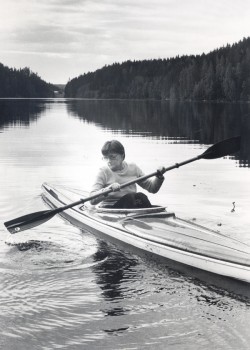
Eeva-Liisa Manner. Photo: Tammi.
Today we have a real treat – a selection of the sumptuously minimalist poetry of Eeva-Liisa Manner (1921–1995) by her near-contemporary, the British poet Herbert Lomas (1924–2011).
Born in Helsinki, Manner spent her youth in Viipuri, in what was then part of Finland; her life was, like Eeva Kilpi’s, marked by evacuation from her home and the subsequent loss of Karelia to the Soviet Union in the Second World War. Her breakthrough collection, Tämä matka (‘This journey’, 1956) marked a major arrival on the modernist poetry scene and her work has been widely translated. Always lyrically minimalist, Manner’s poetry sometimes seemed to approach the limits of language – silence:
The words come and go.
I need words less and less.
Tomorrow maybe
I’ll not need a single one,
she wrote in Niin vaihtuvat vuoden ajat (‘So change the seasons’), as early as 1964.
Lomas brought to the delicate, beautiful textures of Manner’s poetry with its themes of grief, suffering and loneliness a bluff Yorkshire, and entirely masculine, sensibility. For him, Manner had a ‘splendid sanity’ and sense of humour; hers was an oeuvre ‘that heals by listening and recovery’.
Manner’s work has more recently been translated by another English writer, Fleur Jeremiah, in a volume entitled Bright, dusky, bright (Waterloo Press, 2009). A sample of the approach taken by a woman of a different generation can be found here.
*
The digitisation of Books from Finland continues apace, with a total of 360 articles and book extracts made available online so far. Each week, we bring a newly digitised text to your attention.
So many words
25 April 2012 | Articles, Non-fiction
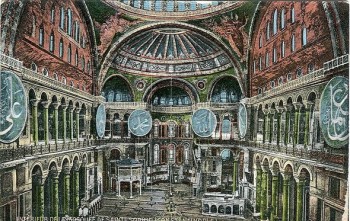
Hagia Sofia, Istanbul: from basilica to cathedral to mosque to museum. Postcard, c. 1914. Photo: Wikipedia/Xenophon
Sacred spaces, repositories of free speech, places of healing? Teemu Manninen awaits the day when libraries become virtual, enabling anybody to visit them, without having to travel across land and sea
The Bodleian Library in Oxford, the Vatican Library, the Bibliotheque Nationale in Paris, New York Public Library, the British Museum Reading Room, the Real Gabinete Portugues De Leitura in Rio De Janeiro, the Library of Congress and the National Library of Finland.
What do all of these have in common, except the obvious fact that they are all famous libraries? To put it another way: why are these famous libraries so famous?
It is not because they have books in them, although that has become one of the main tasks of the library system in the modern world. But a library is not simply an archive. If we in the West are a culture of the book – a culture of the freedom of information and expression – then a library is the architectural incarnation of our way of life: a church built for reading. More…
Last flamenco in Seville
5 November 2010 | Fiction, poetry
The tragic story of a gypsy woman, famously transformed into an opera by Georges Bizet, inspired Saila Susiluoto to write about freedom in the contemporary world: her new collection of poems, entitled Carmen, is set in the shopping centre of an asphalt city. But is this classic femme fatale really a human being – or a cyborg, perhaps? Introduction by Teppo Kulmala
She was made of plastic strips, metal bits, artificial skin, implants, circuit boards. Her heart pumped blood like a real one, her eyes watered as necessary. She was made free and loving, and almost soulful. But the soul is a quirk, said the Creator, a human mistake causing pain and death. And confusion. And the degradation of this world. They left out what they couldn’t say, what they were unable to say. They said: your name is Carmen, go forth, find your balance on threads across the world, you are a meek machine, built to love everything except just one man. You are glowing wires, bright shiny strips of plastic, a mind made of images and tones, your step is light, go, go.
The mall’s scintillating youth choir
(gesticulating in the manner of a musical)
All in good time
17 April 2009 | Letter from the Editors
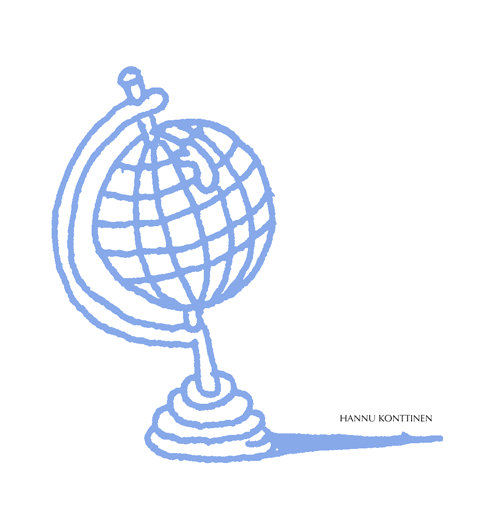 So here it is, Books from Finland’s new website. From the decision to abandon print and go online it’s been a long and sometimes circuitous journey to get here – a journey that has been far longer in the imagining than in the making. More…
So here it is, Books from Finland’s new website. From the decision to abandon print and go online it’s been a long and sometimes circuitous journey to get here – a journey that has been far longer in the imagining than in the making. More…
New from the archive
17 March 2015 | This 'n' that
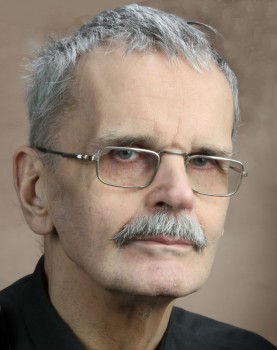
Gösta Ågren. Photo: Studio Paschinsky
Back in the day, in one of our periodic excursions into merchandising – the main criteria were that our goods should be flat (to fit into an envelope) and, of course, literary – we printed Books from Finland t-shirts. They were wildly popular – we must have sold, oh, dozens of them – and top of the list was a shirt with a laconic couplet by Gösta Ågren: ‘Don’t worry / it will never work out.’
Writing in Swedish and hailing from a small village in Ostrobothnia, in the far north-west of Finland, Ågren (born 1936) is the author of poems, essays and biographies. He may often choose to adopt the persona of a country curmudgeon, but the laconic tone of his poems belies a tenderness, a universalism, and an underlying political commitment, that speaks of a love of the world, a desire to make it into a better place.
The volume from which these poems are taken, Jär (‘Here’, 1989), won the Finlandia Prize for Literature in 1989.
*
The digitisation of Books from Finland continues, with a total of 372 articles and book extracts made available online so far. Each week, we bring a newly digitised text to your attention.

